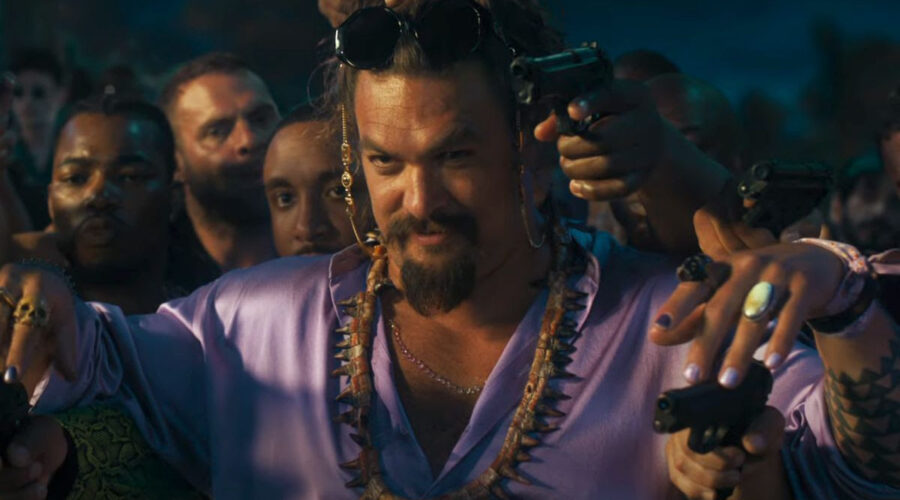When a franchise like The Fast and the Furious reaches double digits in releases and its audience reaches a certain age, cinema loses much of its meaning. Characters become interchangeable, scenes are amalgamated, and all sense of jeopardy is jettisoned for vacuous spectacle. In many ways Fast X is a post-truth blockbuster, immune to parody or ridicule like Donald Trump or Boris Johnson, powerful enough to put the Zucker brothers and Jim Abrahams out of business, where a character can look the audience straight in the eye and ask the existential, “The real question is, how did we let this go on so long?”
Much of Fast X races past like a Spotify playlist on shuffle, replaying the old hits and blasting out tracks you forgot you loved so that for two plus hours that you couldn’t care less if you’ve been hoodwinked again. The action is complete bombast, hurtling along with such wanton abandon, so joyous, so stupid, so vapid, your head feels like it has been hanging out of a car window like a dog with its tongue trailing in the wind.
In one extended set piece a bomb the shape of the Death Star rolls out of control covered in flames, crashing towards the Vatican, divine retribution, the barbarians back at the gates of Rome only to be pinballed into the into the Tiber with a crane, updating Caesar’s extravagant naumachia battles in 46BC.
The crazy ass geometry of Fast X has a plausibility we calculate as we’re trailing in the slip stream of the narrative algorithm. Werner Herzog proclaimed, “Academia is the death of cinema. It is the very opposite of passion. Film is not the art of scholars, but of illiterates.”
Fast X is the art of artificial intelligence programmed to think passionately like an illiterate, and by employing infinite monkey theorem at some point it will create Hamlet.
The diminishing returns of so many movie stars crowbarred into one film is spectacularly checked by the inclusion of Jason Momoa’s as Dante Reyes, haunted by the death of his father, the latest uber villain to break up Vin Diesel’s Dominic Toretto and his extended family.
Momoa is lightning in a bottle, his Reyes is a madcap experiment in machismo, a spornosexual dandy hoovering up the best lines and deftly stealing every scene he’s in. Think Jack Nicholson’s Joker but super jacked and ripped like a demigod come to play with mere mortals. For all the Marvel Cinematic Universe’s precision engineering they haven’t been able to replicate a charismatic villain anywhere close to Momoa’s hilariously brutal turn. At one point Reyes talks shop to his dead henchmen, flies buzzing whilst painting their toenails a precise shade of blue. It may be stolen straight from the Nicholson playbook but if it works, who cares 30 years later?
If there is a criticism of a film that is immune to criticism it is that Momoa needs some colourful henchman to back him up, rather than the countless disposal masked uniforms he surrounds himself with. With the all-star cast already jam packed to the rafters with talent, there isn’t any room for his goons to have distinct characters like in Die Hard. Most Fast and the Furious villains end up as good guys anyway, charmed by that charmless man Dom T and his family values, but Momoa’s Reyes won’t be swayed.
Over two decades since Vin Diesel starred in Pitch Black and The Fast and the Furious, he appears to have had all his sharp edges smoothed out, a powerful force blurred and blunted, no longer the irresistible force or the immovable object. Yet somehow, he is still one of the world’s highest grossing actors thanks to a franchise that has been retooled from a street racing saga to a latter-day James Bond/Mission Impossible hybrid.
We might just be experiencing the decline of Western Civilisation, but who notices when we are living through that decline? Who notices when our minds are trampled on by the juggernauts of intellectual property, by a car speeding down the crumbling face of a hydroelectric dam defying the laws of gravity? Dom T uses a car in the same way Homer Simpson used his gun to tackle everyday situations, he’d change the channel with his car if he could, so when straight faced he utters the immortal line, “You made one mistake. You never took my car” we know he’ll triumph in impossible adversity.
There is only one answer to the question of Fast X, “How did we let this go on so long?”
Because we let it, we secretly enjoy it, and we deserve to suffer for our apathetic complicity.

